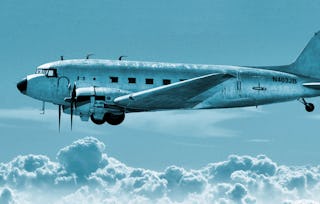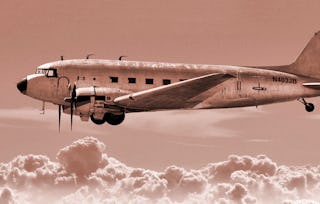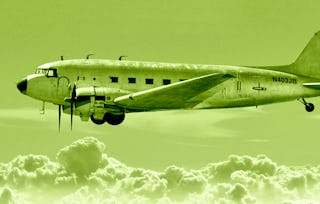More than one century after the Wright brothers' first flight, the flight still defy our intuition. You will learn here how to name the different parts of the airplane and how to describe and quantify its geometry. For that, we need now to share a precise vocabulary to describe the airplane's movement and attitude in space, and a refresher on basic general mechanic principles. You will remind how Newton's 2nd law allows you to determine what force must be applied on an apple - or on an airplane, to modify the magnitude and direction of its speed. Coming back on the concepts of kinetic energy and potential energy, you will discover the very useful concept of total height and you will be able to explain how an airplane can quickly exchange speed for altitude, while changes in total height are much slower.

Gain next-level skills with Coursera Plus for $199 (regularly $399). Save now.

Flight mechanics - The basis
This course is part of Fundamentals of Flight mechanics Specialization

Instructor: Eric Poquillon
25,878 already enrolled
Included with
(488 reviews)
What you'll learn
Use precise and appropriate words to describe an airplane and its motion in the air.
Apply Newton's law to compute the evolution of the trajectory of an airplane, based on the aerodynamic forces acting on it.
Skills you'll gain
Details to know

Add to your LinkedIn profile
15 assignments
See how employees at top companies are mastering in-demand skills

Build your subject-matter expertise
- Learn new concepts from industry experts
- Gain a foundational understanding of a subject or tool
- Develop job-relevant skills with hands-on projects
- Earn a shareable career certificate

There are 4 modules in this course
Along this first week, we want you to get acquainted to the airplane. We will first learn how to name the different parts of the airplane and how to describe and quantify its geometry. And we will see through an exercise that concepts that seem well defined, like the surface of the wing (wing surface), can be, in practice, difficult to measure. This part will allow us to share a common and precise vocabulary.
What's included
3 videos4 readings3 assignments2 discussion prompts1 plugin
We need now to share a precise vocabulary to describe the airplane's movement and attitude in space, and a refresher on basic general mechanics principles. You will review how Newton's second law allows you to determine what force must be applied on an apple - or on an airplane, to modify the magnitude and direction of its speed. Coming back on the concepts of kinetic energy and potential energy, you will discover the very useful concept of total height and you will be able to explain how an airplane can quickly exchange speed for altitude, while changes in total height are much slower. To conclude this week, we invite you on a tour of our full flight simulator Pegasus (Pegase in French), to see how clever use of those concepts in a Head-Up Display might allow you to conduct a perfect approach and landing without a single glance at your speed or altitude indicators.
What's included
3 videos4 readings4 assignments1 discussion prompt
It's time to apply your knowledge to the airplane! You will discover that only a very small number of forces apply on an airplane in flight and that you are able to classify those that change its energy state and those that modify its trajectory. You will discover the concept of load factor and understand why the pilot of a combat aircraft can feel a weight nine-time greater than his actual weight! You will come on board our DR400 light airplane (not a combat airplane indeed) with Newton's apple to better understand what this load factor actually means. Finally, you will establish the lift and propulsion equations, that form the basis of flight mechanics, and you will be able to compute the lift and thrust necessary to follow a given trajectory at a given speed. No apples were harmed in the making of this course.
What's included
5 videos1 reading3 assignments
In this final graded assessment, you will check your knowledge and apply it to solve an actual flight dynamic problem : how to fly a loop in a glider.
What's included
2 readings5 assignments
Earn a career certificate
Add this credential to your LinkedIn profile, resume, or CV. Share it on social media and in your performance review.
Instructor

Offered by
Explore more from Physics and Astronomy

ISAE-SUPAERO

ISAE-SUPAERO

ISAE-SUPAERO
Why people choose Coursera for their career




Learner reviews
488 reviews
- 5 stars
79.91%
- 4 stars
15.77%
- 3 stars
2.25%
- 2 stars
0.81%
- 1 star
1.22%
Showing 3 of 488
Reviewed on Sep 3, 2021
THANKS SIR ERIC FOR TEACHING ME AND OTHERS ABOUT THE BASICS PARTS AND BASIC PRINCIPLES OF FLIGHT AND ITS MECHANICS. A WARM THANKS .
Reviewed on Nov 26, 2024
Terrific course. Easy to understand lectures but beyond simplistic explanations, real world examples, actually doing the calculations to reinforce the learning without being overly technical.
Reviewed on Nov 3, 2022
I am glad I took this course, it was worthwhile and I learned more than I had expected. Thank you to the team that compiled this course and to anyone interested I would highly recommend taking it.
Frequently asked questions
To access the course materials, assignments and to earn a Certificate, you will need to purchase the Certificate experience when you enroll in a course. You can try a Free Trial instead, or apply for Financial Aid. The course may offer 'Full Course, No Certificate' instead. This option lets you see all course materials, submit required assessments, and get a final grade. This also means that you will not be able to purchase a Certificate experience.
When you enroll in the course, you get access to all of the courses in the Specialization, and you earn a certificate when you complete the work. Your electronic Certificate will be added to your Accomplishments page - from there, you can print your Certificate or add it to your LinkedIn profile.
Yes. In select learning programs, you can apply for financial aid or a scholarship if you can’t afford the enrollment fee. If fin aid or scholarship is available for your learning program selection, you’ll find a link to apply on the description page.
More questions
Financial aid available,





